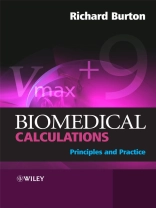’It is said if you take care of the pennies, the pounds will
take care of themselves. Richard Burton’s excellent book takes this
approach to calculations applied to the biomedical
sciences…This is certainly interesting and engaging but it
avoids being complicated.’ -Journal of Biological
Education, April 2009
Biomedical Calculations: Principles and Practice is an
accessible, student-friendly introduction to calculating, applying
formulae and solving quantitative problems within these subjects.
This book targets a problem area for many students and aims to give
them the confidence which they are so often lacking when
undertaking scientific calculations. It takes a unique approach to
the subject and uses unit analysis as a central theme throughout
the book to enhance student understanding.
Clearly structured throughout, little basic knowledge of
mathematics is assumed, but even the most numerate readers will be
interested in the sometimes-novel biological detail. Numerous
worked examples, supplementary questions and practice problems are
provided and although the book is written to be read in sequence,
it will also be a useful reference.
The central theme of the book focuses on the value of unit
analysis in solving quantitative problems, with explanations on how
to avoid errors in calculations and in checking, understanding and
deriving formulae and equations. As a background to this,
there is extensive treatment of physical units, both individually
(e.g. kg, m, mmol) and in combination (e.g. m s ², mmol
L ¹), and also of other aspects of quantitative
thinking. A variety of topics (mostly from physiology,
pharmacology and biochemistry) are used to demonstrate these
calculations in practice.
Key features:
* An accessible, student-friendly introduction for all those
hesitant in calculating, applying formulae and solving quantitative
problems
* An innovative approach to scientific calculations and how to
work with unfamiliar formulae for the biomedical and life
sciences
* Includes modern, up to date definition of p H eliminating the
need for logarithms and a discussion of the importance of p H
* Clear introduction on how to use the book, guidance on units
and unit conversion, and an appendix on basic mathematics and
notation
* Use of unit analysis as a central theme
* Includes numerous worked examples and supplementary questions
throughout the text to enhance student understanding
O autorze
Dr. Richard Francis Burton, Honorary Research Fellow, Thomson Building, Institute of Biomedical and Life Sciences, University of Glasgow, UK.












